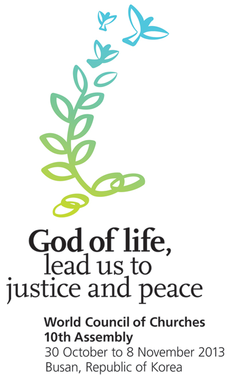WCC and partners strengthen relationship in advance of assembly
22 April 2013
The upcoming 10th Assembly of the World Council of Churches (WCC) is not only a pivotal moment in the life of the WCC global fellowship of 345 member churches but also a defining moment for the WCC and its programmatic and financial partners or "specialized ministries."
In advance of the assembly, to be held this year in Busan, Republic of Korea, 30 October to 8 November, the WCC leadership and staff met 18-19 April in Bossey, Switzerland, with representatives of more than two dozen specialized ministries.
As a pre-assembly event, the group addressed changes in development and mission paradigms, the vision for a continuing and deepening partnership and WCC planning for the future.
The future, as reflected in the assembly theme, “God of life, lead us to justice and peace,” will be a “pilgrimage of justice and peace” for the church, the WCC general secretary, Rev. Dr Olav Fykse Tveit said to the group in his opening remarks.
"Your encouraging presence here today is another visible sign of your support and your willingness to find new ways forward together," Tveit said. "Speaking with you means sharing common values and calling, and therefore also sharing the resources given to us for proper stewardship for the benefit of those who need what we are able to do together."
With specialized ministries, which are church-based development agencies, the WCC is able to implement a variety of programs, including its HIV and AIDS work in Africa, accompaniment programs in the Middle East and Colombia, gender justice, advocacy on climate change, economic justice and arms trade, mission and evangelism, and the work of the Faith and Order commission.
The work also reflects the core of the ecumenical movement, in which churches through their various mission and development agencies and other ecumenical agencies, such as the ACT Alliance, work together with the WCC and its members to express a common voice, vision and witness to the world.
During the meetings the group discussed the changing paradigm of development and mission in the world, the vision and plans for future work together and how the 10th Assembly will launch the partnership.
The paradigmatic shifts include the impact on development and mission of rapid growth of the church in the global south and continuing decline of the church in the global north.
Shifts in agencies that the WCC and specialized ministries work with were also explored, including the prospect of more engagement with a greater variety of church agencies and private-sector businesses.
During a group discussion Friday morning, one member said the goal for the future should be not just action by churches together, the moniker of ACT Alliance, but instead FACT, "flexible action by churches together," emphasizing that the global landscape has changed and churches’ diaconal work needs to change with it.
Expanding on the idea of engaging in a "pilgrimage of justice and peace," Tveit said that "by defining the gift of life in relation to the qualities of justice and peace, we are at the heart of the mandates of your organizations."
In closing remarks, he invited the group to meet again before the assembly to further discuss the meaning of moving forward on a pilgrimage of justice and peace, and then after the assembly to make it operational.
"The pilgrimage must be a plan of action, not just a plan of discussion," Tveit said.
There was an expressed appreciation from the group that the WCC was viewing the future relationship with them as one of action.
"We are with you now and into the future," Susan Sanders of the U.S.-based United Church of Christ Wider Church Ministries said reassuringly at the close of the meetings, which she moderated.
Follow WCC general secretary on Twitter at @OlavTveit





